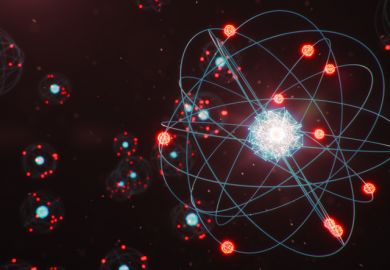“It was very emotional – scary but exciting. We knew we’d found something unusual,” recalled Didier Queloz on spotting 51 Pegasi b, later confirmed as the first known planet orbiting a Sun-like star.
Back in 1995 and then a PhD student, he knew he had hit upon something extraordinary – a find that confirmed that there were solar systems similar to our own – but he did not foresee other consequences of the discovery, namely the start of the “exoplanet revolution” – the boom in the search for habitable planets that might contain life.
“This was a very obscure topic when I did my PhD, but there is now a wave of PhDs and postdocs swimming in this field,” said the Swiss astrophysicist.
Since he and his doctoral supervisor at the University of Geneva, Michel Mayor – with whom he shared the 2019 Nobel Prize in Physics alongside Canadian cosmologist James Peebles – found 51 Pegasi b, more than 4,000 exoplanets have been discovered – thanks, in large part, to Professor Queloz’s work in improving the telescopes and instrumentation needed to spot faraway celestial bodies.
In turn, a thriving space industry – likely to be worth $1.8 trillion (£1.4 trillion) by 2035, according to estimates – has also been built up, powered by the promise of reaching these Earth-like planets at some point.
It is a good example of how the study of distant bodies – 51 Pegasi b is about 6 trillion miles away – continues to exert a huge impact here on Earth, said Professor Queloz, speaking at the annual Lindau Nobel Laureate Meeting in southern Germany last month.
“We use the universe as a lab to explore bigger ideas in physics,” he explained. “The entire science of nuclear energy – including thermonuclear weapons – came from a curiosity with the universe. It turns out that if you know how the Sun works, you can replicate it – it’s one of the major translations of knowledge in the 20th century,” he said.
GPS satellite navigation systems – a spin-off technology from the 1960s space race – are also in this bracket of space science-inspired inventions that have profoundly influenced how we live.
“Einstein’s theory of relativity arose from aesthetic reasons – he wanted to find a symmetry in the universe by understanding the contact of space and time. It wasn’t seen as useful, but it turned out to explain the orbit of Mercury,” Professor Queloz added.
For Professor Queloz, other huge social shifts can be credited as products of space science. “The American Revolution was stimulated by thinking directly related to the concept of the universe and its laws. At the time, the law was one laid down by kings and it couldn’t be questioned. But if you have a law of the universe, then the ‘king’s law’ is less important. It wasn’t the critical element that inspired the likes of Thomas Paine, but it did help to change the mindset of people at that time,” he argued.
Thinking about the cosmos and Earth’s place in it is still hugely important, continued Professor Queloz.
“We know our solar system is not that common – it’s the only solar system known to support life. So because we know we’re so special as a planet, maybe we should be more careful with it. Not just for our sake, but for the universe,” he pondered.
Based at the University of Cambridge’s Cavendish Laboratory – and Sir Isaac Newton’s college, Trinity – since 2013, Professor Queloz has led the university’s exoplanet research group. Now his Nobel win has allowed him to establish a second research base at ETH Zurich – the Centre for Origin and Prevalence of Life, which will consider what caused life on Earth to begin and proliferate, in addition to whether the conditions on certain planets could sustain life.
While this “why are we here?” idea has fired the human imagination for centuries, proper scientific investigation of this age-old idea has become possible only in the past decade, explained Professor Queloz, whose centre brings together chemists, biologists, earth scientists, physicists and environment scientists to probe this issue.
“This topic is in its infancy – the amazing progress in life sciences means we can now think about the chemistry of life,” he said, noting that genome coding that took a year not long ago can now be done in minutes.
“There’s been an amazing push on exoplanet discovery, but scientists from all disciplines are now coming together to think about the biggest question of all – why we have life in this universe,” he said.
That is certainly a massive question but, given that Professor Queloz has already followed in the footsteps of Galileo, Kepler and Copernicus by expanding our knowledge of the universe via stargazing, he might be just the man for it.
后记
Print headline: ‘Space science has driven social shifts’




